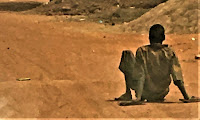I parked the truck between the tree and the old white van with four flat tires. Two “red can kids” (Muslim boy street beggars sometimes as young as four or five) sat a few feet in front of the truck at the edge of the sewer ditch between us and the road. Janet exited the passenger seat and trod the dusty path to the small alimentation” or grocery store to grab a few items. I waited for one of the young boys to walk up to the truck and to point to his mouth with bunched fingertips—the common sign for “hungry.”
There he was, maybe 13-years old, definitely underfed,
pointing fingers to his mouth with his other palm pressed against the
window. I reached into the box normally
filled with small sacks of peanuts that we keep between the seats and found
only one. I leaned over and half rolled
down the window, smiled and handed him the peanuts as I said “Tu dois
partager,” (“You must share.”) He half
smiled and walked towards his friend. I watched as they divided the sack
between them and devoured the contents.
The other boy turned to look back at me, likely hoping for
more peanuts. I looked in the box and
all that remained was one of our sacks of rice and beans that we give to
mothers with children who beg along the road.
The begging women can cook the contents where the red can kids cannot. The boys are routinely underfed by Muslim
overseers who collect whatever money they garner from passing motorists. The beckoning face at the window was too
much. I gave him what I had, the sack of
rice and beans. Perhaps he knew someone
who would cook it for him.
Janet climbed into the truck with her bag of groceries. I started the truck and as I prepared to shift
into reverse I glanced over to where the two boys were sitting. I paused.
They had opened the sack and were warily testing the uncooked rice. Their experiment didn’t last long and they
closed the sack. I continued backing out
from the tight space between the tree and the white van with four flat tires
and slowly drove along the narrow road. I slowed even more as we passed the
small, road-side mosque where the collection of sandals outside revealed it was
the Muslim sunset prayer, the Salat al-Maghrib.
Even after eight years of sharing food with the hungry of
Burkina, the image of the boys testing the hard rice lingered before me as we
bounced down the rutted road towards home. This is another unmet need among so
many. Now to find something a bit more
substantial than peanuts.
God is always good.




